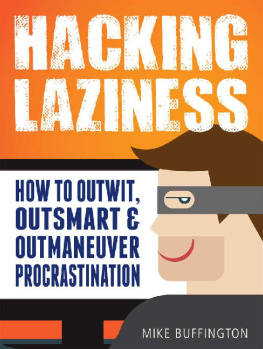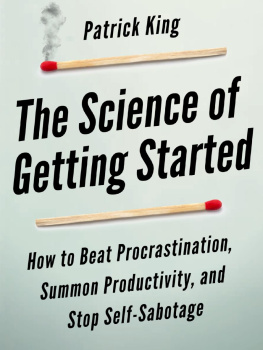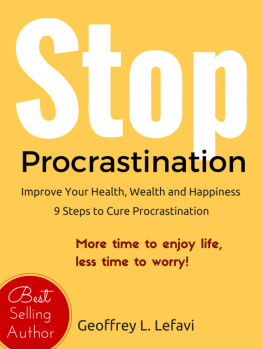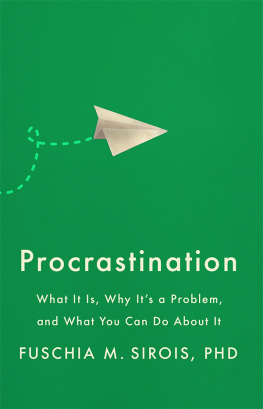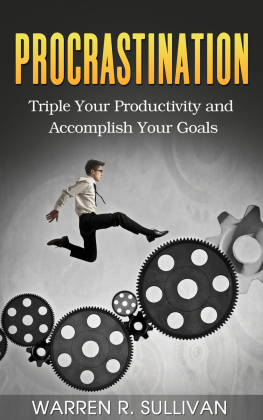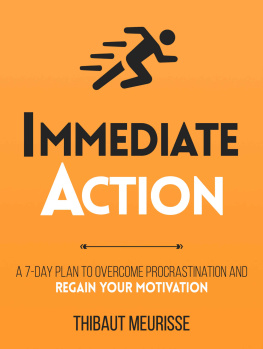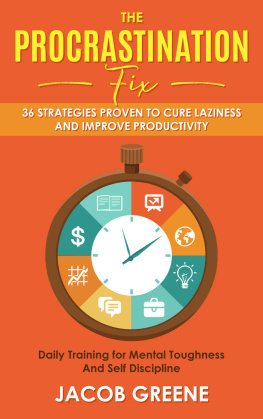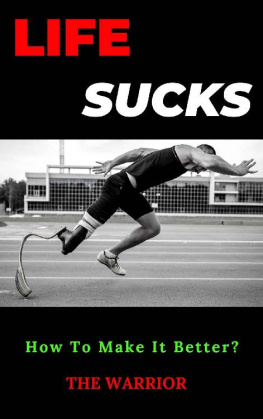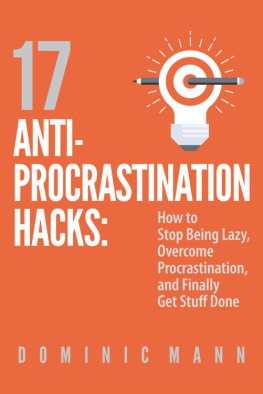
Hacking Laziness
By Mike Buffington
Hacking Laziness
First Edition
Copyright 2015 by Mike Buffington
All rightsreserved. No part of this book may be used or reproduced inany mannerwhatsoever without written permission except in the case of briefquotationsembodied in critical articles and reviews.
Dedicated to my wife Karen and dog Murphy
Table of Contents
LegalDisclaimer
This book is for informationalpurposes only.
This book should not be consideredmedical advice. Theauthor is not a doctor. For medical advice, please seek the advice of aqualified health care practitioner.
This book should not be consideredfinancial advice. Theauthor is not a financial adviser. For financial advice, please seekthe adviceof a qualified financial adviser.
Preface
Confession: I have been aprocrastinator all my life.
I was the kid putting together hisscience project the nightbefore it was due. I always waited until the last possible moment tostart onmy research papers. And I wouldn't vacuum my room until the dustbunnies werethreatening to declare their own kingdom.
My car's oil only got changed out offear my engine wouldsoon seize up. Bills got paid at the last minute, racking up frequentlatefees. Magazines and books I intended to read "someday" would pile uptowards the ceiling. My house was a study in clutter.
My work life wasn't much better. Iwould completeassignments in a flurry of last-minute activity. It always felt I was astepbehind, trying to catch up to life's demands. I was living areactionary life,going from crisis to crisis, never getting ahead. Instead of takingaction, Iwould often find myself immobilized by fear and confusion. Which of the30pressing things should I deal with first? I found it easier just toslip intopleasant diversions, mostly television, video games, and the internet.
After years of disappointing resultsin every area of mylife, I got fed up. I asked myself, "Why is this happening?";"What exactly is my problem, why can't I get myself to do the things Iknow I should be doing?"
I started reading everything I couldfind onprocrastination. I spent hours each day contemplating the causes. Whatexactlywas going on? My extensive reading gave me some clues: I had a fear offailure;a fear of success; a lack of confidence. I gathered hundreds ofanti-procrastination tips. I tried many of them, with no lastingsuccess. Somethingdeeper was needed than a band-aid approach.
Most of the books Ive read seemed tohave been written bypeople whove never had a procrastination problem themselves. They weremostlywritten by high achievers who tried to distill what made them suchgreataction-takers in the first place. That's kind of like a weight-lossbook beingwritten by someone who has never been more than 5 pounds overweight intheirentire lives. I needed a book by a reformed procrastinator that couldactuallyhelp me, but couldn't find one.
My breakthrough came when I finallyfigured out exactly whyI was procrastinating on any given action. I discovered an actualformula, onewhich I will be sharing with you in the next chapter. This formula hadfourcritical factors. By manipulating, or "hacking", these four factors,I could tip the balance from procrastination towards action on anyactivity Iso desired. It was the magic key that destroyed my lifelong habit ofprocrastination.
I am proud to share this secretformula with you, knowing itcan help you as it has helped me.
Introduction
"Thesecret of success is learning how to use pain andpleasure instead of having pain and pleasure use you. If you do that,you're incontrol of your life. If you don't, life controls you."
-TonyRobbins
Hacking any system consists of twothings: understanding andexploitation. You must first gain an understanding of whatever systemyouintend to hack, and then exploit any weaknesses you uncover.
Procrastination itself can be thoughtof as a system, onethat can be understood, and its weaknesses exploited.
Why do we procrastinate? In anyparticular moment, why do wechoose not to do something we know we really should be doing?
The answer is fundamentally simple.We procrastinate becausethe thing we are procrastinating on is painful to us for variousreasons, or atleast not pleasurable enough to override whatever other activity may beathand.
There are four factors at work here:
On the side of procrastination:
- The Pain of Doing these are the pains, physical andmental, of taking action: the sweat, blood, tears, and fears.
- The Pleasure of Not Doing These are things like comfort,the pleasure of rebelling, and the other activities to be done instead(TV,internet, etc.)
On the side of taking action:
- The Pain of Not Doing these are the negative consequencesof procrastination: failing grades, late fees, disappointment.
- The Pleasure of Doing These are the positive consequencesof taking action: pride, acknowledgment, rewards of all kinds.
These four factors balance againstone another for any givenaction, giving us an overall bias towards either action orprocrastination.This can be visually represented as a scale:

The four factors are like weights ona scale: when the scaletips towards action, we take action; when the scale tips towardsprocrastination, we procrastinate. This is the "formula" which equalseither procrastination or action. Simple.
This invisible weighing of factorshappens internally foreach one of us. We are usually unaware this is happening, and unawareof thefactors involved. Instead, we justify our inaction by telling ourselves"Ijust don't feel like doing it right now."
But that excuse is not good enoughfor a hacker. A hackerburns to understand why they "just don't feel likedoing it".With this formula, you now have a better understanding than 99.9% ofthe peoplestruggling with procrastination. That's a good start!
In this book, we'll show you how toexploit each one ofthese four factors, shrinking those on the side of procrastinationwhilegrowing the ones on the side of action.
When that happens, the scale will tiptowards action, andyou will take action automatically. That's the best part you won'thave to forceyourself to take action. Once the scale is tipped towards action, youwill takeaction automatically.
Being a hacker is great, isn't it?
Reducingthe Pain of Doing
"Nobodycan hurt me without my permission."
-MahatmaGandhi
Man gives much greater emphasis topain over pleasure. If aman finds $20 on the street, it puts a little spring in his step forthat day.If that same man gets ripped off for $20, he may stew over it for days,weeks,or even years.
Pain, or the fear of pain, is theprimary ruler of ouractions. This pain includes:
- Social pressures
- Self-imposed expectations and limitations
- Fear of success
- Fear of failure
- Lack of confidence
- Fear of physical and mental discomfort
- Time pressures
In this chapter, we will revealseveral hacks to minimize oreliminate these pains, tipping the scale towards action:

Responsibility is Job One
"Ifyou accept the pain, it cannothurt you."
-HughMacleod
Fear of success, fear of failure,lack of confidence in myexperience, these are the most powerful drivers of procrastination.Hundreds,even thousands of books have been written on these subjects. Peoplespend yearson therapists' couches trying to uncover the cause of theseafflictions, hopingto one day overcome them. If that's your thing, more power to you. ButI don'thave time for all of that.
Next page
